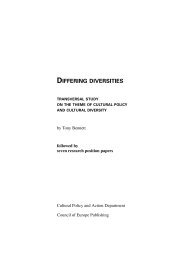Why we need European cultural policies: the impact of EU ...
Why we need European cultural policies: the impact of EU ...
Why we need European cultural policies: the impact of EU ...
Create successful ePaper yourself
Turn your PDF publications into a flip-book with our unique Google optimized e-Paper software.
1 The French term acquis communautairerefers to <strong>the</strong> set <strong>of</strong> <strong>EU</strong> laws and <strong>policies</strong>.Conditions for candidate countries joining <strong>the</strong><strong>EU</strong> included achieving a stable democracy,a competitive market economy, and <strong>the</strong>capacity to implement <strong>EU</strong> laws and <strong>policies</strong>(incorporating and implementing acquiscommunautaire).2 Obuljen N, (2004a)) Impact <strong>of</strong> <strong>European</strong>integrations on Croatian <strong>cultural</strong> policyMaster’s <strong>the</strong>sis, University <strong>of</strong> Zagreb: Faculty<strong>of</strong> Political Sciences, 25 February.3 Obuljen N, (2004b). `Assessing <strong>the</strong><strong>impact</strong> <strong>of</strong> <strong>the</strong> <strong>EU</strong> Enlargement on <strong>cultural</strong><strong>policies</strong> in countries in transition.’ inCultural transitions in sou<strong>the</strong>astern Europe,S˘ vob-Dokić , Nada (eds) pp 123–141Zagreb: Institut za med¯unarodne odnose.4 I would like to thank <strong>the</strong> <strong>European</strong>Cultural Foundation and <strong>the</strong> Bank <strong>of</strong> S<strong>we</strong>denTercentenary Foundation as <strong>we</strong>ll as <strong>the</strong> CPRAJury for giving me <strong>the</strong> opportunity to work onthis research. Thanks also to my colleaguesBiserka Cvjetic˘anin, Nada S˘ vob-Dokić , ZrinjkaPerus˘ ko, Jaka Primorac, Joost Smiers, GarryNeil, Jadran Antolović and Igor Bukatko whogave <strong>the</strong>ir comments on this study as <strong>we</strong>ll asto my <strong>the</strong>sis adviser Zdravko Petak, pr<strong>of</strong>essorat <strong>the</strong> Faculty <strong>of</strong> Political Science, University<strong>of</strong> Zagreb.5 The principle <strong>of</strong> subsidiarity is explainedin Article 5(2) <strong>of</strong> <strong>the</strong> Treaty, which states that<strong>the</strong> Community shall take action only if andin so far as <strong>the</strong> objectives <strong>of</strong> <strong>the</strong> proposedaction cannot be sufficiently achieved by <strong>the</strong>member states and can <strong>the</strong>refore, by reason<strong>of</strong> scale and effects <strong>of</strong> <strong>the</strong> proposed action,be better achieved by <strong>the</strong> Community. Thegeneral aim <strong>of</strong> <strong>the</strong> principle <strong>of</strong> subsidiarityis to guarantee a degree <strong>of</strong> independencefor a lo<strong>we</strong>r authority in respect to a centralauthority. It involves sharing <strong>of</strong> po<strong>we</strong>rsbet<strong>we</strong>en several levels <strong>of</strong> authority, a principlethat forms <strong>the</strong> institutional basis for federalstates. When applied in <strong>the</strong> Communitycontext, <strong>the</strong> principle means that <strong>the</strong> memberstates remain responsible for areas that <strong>the</strong>yare capable <strong>of</strong> managing more effectively<strong>the</strong>mselves, while <strong>the</strong> Community is giventhose po<strong>we</strong>rs that <strong>the</strong> member states cannotdischarge satisfactorily.6 See for example:a) Audéoud O, (2002).Study on <strong>the</strong> mobility and free movement <strong>of</strong>people and products in <strong>the</strong> <strong>cultural</strong> sector,Study No. DG EAC/08/00, PartnershipCEJEC - Université PARIS X-EAEAb) MKW Wirtschaftsforschung Gmbh, (2001).Exploitations and development <strong>of</strong> <strong>the</strong> jobpotential in <strong>the</strong> <strong>cultural</strong> sector in <strong>the</strong> age <strong>of</strong>digitalisation: Final report, Munich:MKW Wirtschaftsforschung Gmbh.c) <strong>European</strong> Commission, (2002).Fourth report from <strong>the</strong> <strong>European</strong> Commissionto <strong>the</strong> <strong>European</strong> Council, <strong>the</strong> <strong>European</strong>Parliament, <strong>the</strong> <strong>European</strong> Economic andSocial Committee and <strong>the</strong> Committee <strong>of</strong><strong>the</strong> Regions on <strong>the</strong> application <strong>of</strong> Directive89/552/EEC “Television without frontiers”,COM (2002) 778, final, Brussels.Notes77














